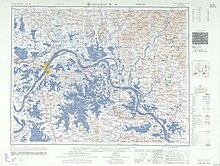Dongxihu District
Dongxihu
东西湖区 | ||||||||||||||||||||||||||||||||||||
|---|---|---|---|---|---|---|---|---|---|---|---|---|---|---|---|---|---|---|---|---|---|---|---|---|---|---|---|---|---|---|---|---|---|---|---|---|
 Hongtu Boulevard Station | ||||||||||||||||||||||||||||||||||||
 | ||||||||||||||||||||||||||||||||||||
 Dongxihu Location in Hubei | ||||||||||||||||||||||||||||||||||||
| Coordinates: 30°37′27″N 114°08′45″E / 30.6241°N 114.1458°ECoordinates: 30°37′27″N 114°08′45″E / 30.6241°N 114.1458°E[1] | ||||||||||||||||||||||||||||||||||||
| Country | People's Republic of China | |||||||||||||||||||||||||||||||||||
| Province | Hubei | |||||||||||||||||||||||||||||||||||
| Sub-provincial city | Wuhan | |||||||||||||||||||||||||||||||||||
| Township-level (4th) subdivisions | 12 | |||||||||||||||||||||||||||||||||||
| Area | ||||||||||||||||||||||||||||||||||||
| • Total | 439.19 km2 (169.57 sq mi) | |||||||||||||||||||||||||||||||||||
| Population (2010)[3] | ||||||||||||||||||||||||||||||||||||
| • Total | 451,880 | |||||||||||||||||||||||||||||||||||
| • Density | 1,029/km2 (2,670/sq mi) | |||||||||||||||||||||||||||||||||||
| Time zone | UTC+8 (China Standard) | |||||||||||||||||||||||||||||||||||
| Wuhan district map |
| |||||||||||||||||||||||||||||||||||
| Website | http://www.dxh.gov.cn/ | |||||||||||||||||||||||||||||||||||
Dongxihu District (simplified Chinese: 东西湖区; traditional Chinese: 東西湖區; pinyin: Dōngxīhú Qū; lit. 'east west lake') is one of 13 urban districts of the prefecture-level city of Wuhan, the capital of Hubei Province, China, forming part of the city's western suburbs. It lies on the north (left) bank of the Han River. Along with Qiaokou, it is the only district of Wuhan to not have a Yangtze River shoreline; it borders the districts of Huangpi to the northeast, Jiang'an to the east, Jianghan, Qiaokou, and Hanyang to the southeast, and Caidian to the southwest. The district also borders the prefecture-level city of Xiaogan to the north and west.
Geography[]

Administrative Divisions[]
Dongxihu District currently administers eight subdistricts, one administrative committee, and three local offices:[4][5]
| Name (with translation) | Chinese (S) | Hanyu Pinyin |
|---|---|---|
| Wujiashan Subdistrict () | 吴家山街道 | Wújiāshān Jiēdào |
| Jiangjunlu Subdistrict () | 将军路街道 | Jiāngjūnlù Jiēdào |
| (Compassionate Benevolence) | 慈惠街道 | Cíhuì Jiēdào |
| () | 走马岭街道 | Zǒumǎlǐng Jiēdào |
| Jinghe Subdistrict () | 径河街道 | Jìnghé Jiēdào |
| (Long Youth) | 长青街道 | Chángqīng Jiēdào |
| (New Channel Town) | 新沟镇街道 | Xīngōuzhèn Jiēdào |
| (Gold and Silver Lake) | 金银湖街道 | Jīnyínhú Jiēdào |
| New Area Administrative Committee (Evergreen Park) | 常青花园新区管委会 | Chángqīnghuāyuán Xīnqū Guǎnwěihuì |
| /Boquan[6] Office (Cedar Spring) | 柏泉办事处 | Bǎiquán[7][8] Bànshìchù |
| Office (Xin'an Ferry) | 辛安渡办事处 | Xīn'āndù Bànshìchù |
| Township () | 东山办事处 | Dōngshān Bànshìchù |
Transportation[]
Wuhan Metro Line 1 have 5 stations in Dongxihu District.
Wuhan Metro Line 2 passes through Dongxihu District. There are 4 stations of Line 2 in Dongxihu District: Hongtu Boulevard station, Changqingcheng station, Jinyintan station and Changqing Huayuan station.
The northern end of Line 6 runs in Dongxihu District. There are 10 stations of Line 6 in Dongxihu District: , Matoutan Park station, , , , Jinyinhu Park station, Jinyinhu station, Garden Expo North station, Polytechnic University station and Changqing Huayuan station.
References[]
- ^ Google (2014-07-02). "Dongxihu" (Map). Google Maps. Google. Retrieved 2014-07-02.
- ^ "Wuhan Statistical Yearbook 2010" (PDF). Wuhan Statistics Bureau. p. 15. Archived from the original (PDF) on November 5, 2011. Retrieved 2011-07-31.
- ^ "武汉市2010年第六次全国人口普查主要数据公报" (in Chinese). Wuhan Statistics Bureau. 2011-05-11. Archived from the original on 2011-10-25. Retrieved 2011-06-11.
- ^ "区划简码 (translation: Administrative Division Codes)" (PDF) (in Chinese). Dongxihu District government website. 30 November 2017. Retrieved 19 December 2017.
"{...}吴家山街{...}柏泉{...}将军路{...}慈惠{...}走马岭{...}径河{...}长青{...}新沟镇{...}辛安渡{...}东山{...}金银湖{...}常青花园{...}" (translation: {...}Wujiashan Subdistrict{...}Boquan{...}Jiangjunlu{...}Cihui{...}Zoumaling{...}Jinghe{...}Changqing (长青){...}Xingouzhen{...}Xin'andu{...}Dongshan{...}Jinyinhu{...}Changqinghuayuan{...}.)
- ^ "东西湖区历史沿革 (translation: The Historical Development of Dongxihu District)" (in Chinese). 行政区划网站 (translation: Administrative Divisions Website). 6 August 2014. Retrieved 19 December 2017.
"2010年第六次人口普查,东西湖区常住总人口452053人,其中:吴家山街道115067人,柏泉办事处9402人,将军路街道42259人,慈惠街道16373人,走马岭街道26744人,径河街道36937人,长青街道41648人,辛安渡办事处12620人,东山办事处14446人,新沟镇街道17839人,金银湖街道58891人,常青花园新区管委会55353人,台商工业园区管委会4474人。" (abbreviated translation: In 2010{...}, Dongxihu District{...} including: Wujiashan Subdistrict{...}, Boquan Office{...}, Jiangjunlu Subdistrict{...}, Cihui Subdistrict{...}, Zoumaling Subdistrict{...}, Jinghe Subdistrict{...}, Changqing (长青) Subdistrict{...}, Xin'an Office{...}, Dongshan Office{...}, Xingouzhen Subdistrict{...}, Jinyinhu Subdistrict{...}, Changqinghuayuan (常青花园) New Area Administrative Committee{...}, Taishang Industrial Park Administrative Committee{...}.)
- ^ 认识武汉② [Learning About Wuhan] (in Simplified Chinese and English). 中共东西湖区委宣传部 Publicity Department of the CPC in Dongxihu District, 武汉新港空港综合保税区(空港) Wuhan New Port Airport Free Trade Zone, 长江日报传播研究院 Institute of Communication Studies of Changjiang Daily. 2018. pp. 10–11.
柏泉古井中数仞清泉,散发千年韵味悠长{...}Crystal-clear springs in the Boquan Ancient Well have captured the imagination for a 1,000 years,{...}
- ^ Many roads in the area use this character and the street signs use the pronunciation 'bai'. http://map.baidu.com/#panoid=02000200001412051401321005B&panotype=street&heading=-23&pitch=3&l=12&tn=B_NORMAL_MAP&sc=0&newmap=1&shareurl=1&pid=02000200001412051401321005B
- ^ http://www.sohu.com/a/112396268_459886
External links[]
- Wuhan
- County-level divisions of Hubei
- Hubei geography stubs

